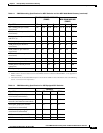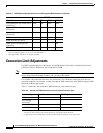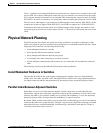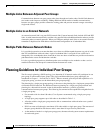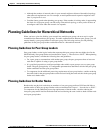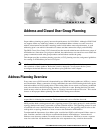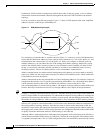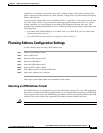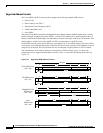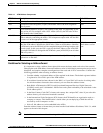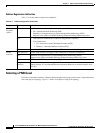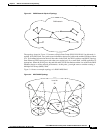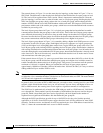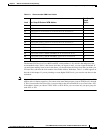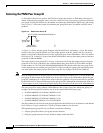
3-3
Cisco PNNI Network Planning Guide for MGX and SES Products, Release 5
Part Number OL-3847-01 Rev. D0, April, 2004
Chapter 3 Address and Closed User Group Planning
Planning Address Configuration Settings
connections as it attempts to locate the correct node. A better design would use the longest possible
prefix to represent all the interfaces on a node, and then a longer prefix on each interface that uniquely
defines each interface.
At the end of this chapter, there are two worksheets (Table 3-4 and Table 3-5) into which you can enter
your WAN address values. If you are familiar with designing PNNI address structures, or if a plan is
already completed, you can go directly to the Address Plan Worksheet and enter the values. The
procedures for configuring ATM addresses on Cisco MGX and SES switch products are described in the
following guides:
• Cisco MGX 8850 (PXM1E/PXM45), Cisco MGX 8950, Cisco MGX 8830, and Cisco MGX 8880
Configuration Guide, Release 5
• Cisco SES PNNI Controller Software Configuration Guide, Release 3
Planning Address Configuration Settings
Use the following steps to create a WAN address plan:
Step 1 Select an ATM address format
Step 2 Select a PNNI level
Step 3 Select the PNNI peer group ID
Step 4 Select the ATM address
Step 5 Select the ILMI address prefix
Step 6 Select the SPVC address prefix
Step 7 Plan address prefixes for AINI and IISP links
Step 8 Select static addresses for UNI ports
These steps are described further in the remainder of this chapter.
Selecting an ATM Address Format
Each PNNI node must be configured for at least one ATM address format. This is an ATM requirement
that must be considered when choosing PNNI addresses. To establish ATM connections, each ATM UNI
end system must have at least one ATM End System Address (AESA) that uniquely identifies that ATM
endpoint. This section explains the supported AESA address formats and their structures.
Caution Each node must support the address format of all its neighboring nodes.



